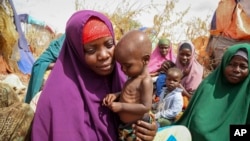The U.N. Sustainable Development Goals Report 2022 warns global crises and disasters are putting in jeopardy attainment by the end of the decade of the 17 goals adopted by U.N. member states in 2015.
Information in the report, issued this week, from more than 200 countries indicates COVID-19, climate change, and proliferating conflicts are having a devastating impact on efforts to end poverty and hunger and improve global health and security.
Assistant Director of the U.N. Statistics Division Francesca Perucci said COVID-19 has wiped out more than four years of progress in alleviating poverty. She said the pandemic has pushed 93 million more people into extreme poverty, and many more into acute hunger.
She said the increase in the number, and global spread of conflicts, the largest since 1946, has forced more than 100 million people from their homes.
“The Ukraine crisis has caused food, fuel, and fertilizer prices to skyrocket, further disrupted supply chains and global trade, roiled financial markets, and threatened global food security and aid flows. Humanity is also on the verge of a climate catastrophe with impacts already being witnessed and felt by billions of people across the world,” said Perucci.
Scientists say greenhouse gas emissions rose by a record 6% last year. To avoid the worst impacts of climate change, they say carbon dioxide emissions must peak before 2025, decline 43% by 2030 and fall to net zero by 2050.
Scientists warn voluntary national commitments to cut greenhouse gas emissions are insufficient to meet this goal. Instead, they say those commitments will lead to a rise of nearly 14% in CO2 emissions over the next decade.
Perucci said the brunt of these global crises will be felt by the poorest and most vulnerable people.
“Women struggle with the constraints of lost jobs and livelihoods, derailed schooling, and increased burdens of unpaid care work at home. Meanwhile, existing evidence suggests that violence against women and girls has been exacerbated by the pandemic and child labor and child marriage are on the rise,” she said.
U.N. officials say solutions can be found in strengthening social protection systems and addressing the root causes of increasing inequality.
They say investing in clean energy can improve chances of reducing global warming and stress the need for collective action and political commitment.




